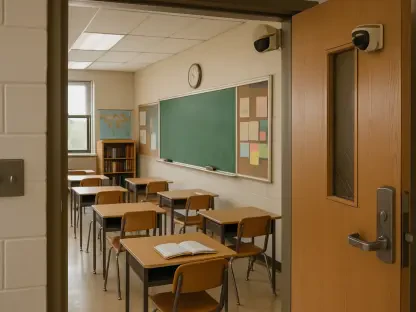Located in the heart of Wilson County, Tennessee, LaGuardo Elementary School is facing an escalating crisis threatening both the environment and public health due to its reliance on a temporary sewer system. As the school struggles with inadequate sewage management, the Tennessee Department of Environment and Conservation (TDEC) has reported six serious violations, highlighting significant lapses in oversight by the Water and Wastewater Authority of Wilson County (WWAWC). This situation emphasizes the need for effective infrastructure and regulatory compliance to safeguard community well-being.
Unmasking Infrastructure Failures
Surface Saturation and Wastewater Overflow
One of the most striking issues lies in the inability of the current sewer system to cope with wastewater effectively, leading to surface saturation and potential overflow hazards. The existing infrastructure has been overwhelmed, unable to contain wastewater as intended, risking environmental pollution and community health. Initial steps, such as installing straight pipes, have proven insufficient in addressing the burgeoning problem, prompting calls for immediate action and underscoring the severity of negligence in effective waste management.
Discrepancies in Permit Documentation
The challenges deepen with inaccuracies in the permit application process. The permit incorrectly listed the capacity and scale of the lands and homes serviced by the sewer system, thus exacerbating strains on the infrastructure. Originally estimated to serve 249 homes using 8.8 acres, it surfaced that the system actually served 293 homes on a mere 2.6 acres. This oversight placed undue pressure on facilities already operating beyond their limits, resulting in critical infrastructure stress points. Without corrective measures, these inconsistencies risk substantial long-term implications for both the community and local governance.
Regulatory Oversight and Its Consequences
Delays in Essential Documentation
Since October 2024, TDEC has been awaiting updated engineering maps and “as-built” plans from the WWAWC, paramount for verifying current system capacity and requirements. While a 90-day extension for submission was granted, the deadline elapsed without the necessary documentation, exposing an alarming lack of regulatory adherence. This bottleneck exacerbates the challenge of implementing corrective measures, obstructing efforts toward achieving compliance and transparency. As the WWAWC struggles to address these document deficiencies, the call for accountability grows more pressing from concerned stakeholders.
Unauthorized Expansion Efforts
In a bid to accommodate the school’s needs, the WWAWC proceeded with unauthorized expansions, further compounding regulatory breaches. Without necessary approvals, the facility’s infrastructure projects continue unchecked, raising concerns about governance efficacy and legal compliance. While a modification request has now been submitted, the commencement of construction without prior authorization reflects poorly on the authority’s commitment to regulatory protocols. These events highlight the essential role of oversight in urban planning and development, emphasizing the need for robust checks and accountability.
Operational Shortcomings and Community Impact
Failure to Install Approved Technology
Rooted in historical lapses is the failure to build an approved drip dispersal system since 2007, which would have significantly improved wastewater management capacity. Its absence renders the current system ill-prepared to handle the expected influx from LaGuardo Elementary School, threatening operational stability. This technological inadequacy reflects deeper systemic issues in infrastructure planning that require redress through modern solutions and sustainable investment. The need to bridge operational inefficiencies is crucial to ensure a safe and sustainable environment for future generations.
Underutilization of Available Resources
Despite permissions for extensive treatment land usage, actual operations expand over only a limited area, compounding existing capacity challenges. The discrepancy underscores a critical oversight in aligning available resources with functional needs, contributing to system overburden. This underutilization not only misrepresents asset management efficiency but also affects budget handling, necessitating strategic realignments. Addressing these operational disconnects can mitigate long-term environmental threats and restore confidence in public resource management.
Community Reaction and Moving Forward
Public Sentiment and Demands for Accountability
Residents around LaGuardo Elementary have expressed growing frustrations, spurred by systemic neglect and visible sewage-related disruptions. The community’s concerns were voiced passionately at a recent school board meeting, where demands for accountability and leadership changes within the WWAWC were much discussed. The present situation has undeniably catalyzed a dialogue about leadership transparency and policy efficacy, as highlighted by stakeholders including Ken Young, urging comprehensive governmental intervention. This community push for prompt action could serve as a catalyst for reform in water management protocols.
Ongoing Efforts for Compliance
LaGuardo Elementary School, nestled in Wilson County, Tennessee, finds itself at the epicenter of a growing crisis impacting both the environment and public health. The root of this issue lies in the school’s dependence on a makeshift sewer system, which struggles to manage the school’s wastewater effectively. Consequently, the Tennessee Department of Environment and Conservation (TDEC) has flagged six notable violations, underscoring severe shortcomings in the oversight by the Water and Wastewater Authority of Wilson County (WWAWC). This alarming situation serves as a stark reminder of the necessity for reliable infrastructure and stringent regulatory adherence to protect community well-being. Schools should be places that promote safety and education, but without appropriate sewage systems and compliance, they risk becoming breeding grounds for health and environmental problems. This scenario calls for urgent attention to ensure safety standards and improve the infrastructure to uphold community health standards.









